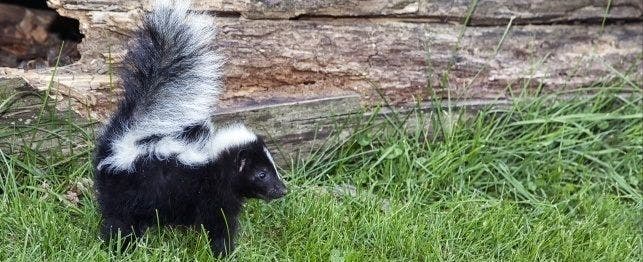
What to Do When Your Dog Has Been Skunked
Your Dog’s Been Skunked – Here’s What You Can Do
There are four words every dog should know: Never chase a skunk. Skunks are well known for their defense system. They spray a thick, yellow, oily – and very stinky – secretion from two scent glands located on either side of the anus. The principle component of the odor is an organic compound called mercaptan, and that’s why it smells so bad.
These smelly mercaptans – and they smell really bad – contain sulfur. In a concentrated form the smell is almost unbearable, but it takes only a few parts per million for the average nose to wrinkle. For this reason, mercaptans are added to odor-free natural gas so that we can detect leaks from the stove or furnace.
Skunk spray is a degradation product from urine. It is stored in anal sacs and released whenever the skunk feels threatened. Skunks are not aggressive animals and would rather retreat from an enemy, but if threatened it will arch his back, raise his tail high, and start hissing and stomping his front feet on the ground. This is a warning. He may even do hand stands with his back and tail arched toward the enemy. Finally, he will bend into a U-shape with his head and his butt facing the enemy and let it go, directing his spray at the enemy’s face.
Skunks are able to spray an enemy up to 16 feet away (accurately for the first 10 feet). An animal that chases or otherwise frightens a skunk may end up covered with this foul substance. Frequently, the face of the dog or cat is the primary target for the skunk spray. Along with the odor, the spray can produce nausea and burning of the eyes, although the effects are temporary and will not cause permanent damage. Nevertheless, if you notice redness, irritation or rubbing/pawing at the eyes, flush your pet’s eyes and call your veterinarian.
More Serious Problems From Skunk Spray
Recently, there has been a report of skunk spray causing anemia in a dog. It is thought that the skunk spray contains substances, thiols and other compounds that act as strong oxidizing agents.
It was speculated that this spray was absorbed by the dog and caused methemoglobinemia and Heinz body anemia. If you dog has been sprayed with a skunk within the past 3 to 5 days and is exhibiting signs of lethargy, weakness, or discolored urine, see your veterinarian immediately.
De-odorizing Your Dog from Skunk Odor
Removing the skunk odor from your dog can be quite challenging. There are several chemical methods of removing or reducing odor: neutralizing the odor, bonding the odor particles and absorbing the odor. Some pets will continue to smell for weeks, especially when the environment is damp or their hair gets wet.
- Neutralization works by combining two odors to create a third odor that is weaker in intensity and more pleasant.
- Bonding works by temporarily changing the chemical structure of the odor particles. Unfortunately, this generally only lasts for up to four hours.
- Absorption is another method which results in the odor particle being consumed by the odor control product particles.
Over the years, various products and recipes have been tried to diminish skunk odor. Some are more effective than others. Suggested methods for removing the odors include:
- Many people have tried masking the skunk odor with perfumes and shampoos, but this rarely works since both the cover-up odor as well as the skunk odor can still be detected.
- Bathing in tomato juice is a popular suggestion but is seldom thought to work.
- The best home remedy for removing skunk odor is bathing the pet in a mixture of one quart 3 percent hydrogen peroxide, 1-cup baking soda and one teaspoon liquid soap. Allow this mixture to sit on your pet for about 10 minutes then rinse with tap water. Be careful not to get the solution in your dogs eyes.
- There are also several commercial formulations specifically made to neutralize the odor of skunk spray, such as Skunk Off® and can generally be purchased either at your family veterinarian’s office or a nearby pet store. These products may be the most effective of the ones listed.